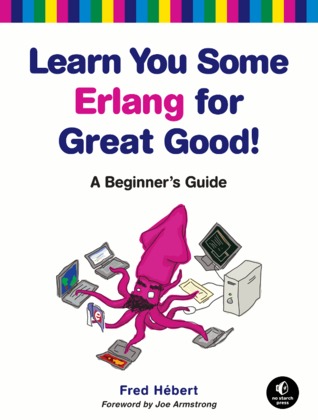Books that changed my career - Learn You Some Erlang For Great Good!
This blog post is another one in the series which contains the most influential books that I have read in my programming career. This is my private ranking, each post contains a good dose of my private opinions (you have been warned), but besides that I hope that you will find it valuable.
Why should I care?
The shortest and simplest answer is - you should care if you are interested in Erlang VM related topics.
It is a book for a specialized audience. Probably you will not be interested if you are not interested in learning Erlang or diving into ecosystem built around it. But if you would like to learn a new programming language - it is a very good book for a newcomer. Besides that, you should also read the Joe Armstrong’s book “Programming Erlang, 2nd Edition” - which is a classic position, written by one of language creators.
Also, if you are dealing with Erlang operations (e.g. you are a DevOps person in the project which uses Erlang), the same author wrote a book Erlang in Anger, which is an awesome source of knowledge - it is full of hints, small tools and scripts and many useful guides, based on author’s extensive experience (Heroku is the place when you probably can deal with huge amount of unusual problems ![]() ).
).
About the book

That book was mine entry point into the Erlang world. It is a really good source of knowledge for newcomers, it is also complete - it covers all important topics from language basic syntax to more advanced topics related e.g. with OTP or building distributed systems. It is very pragmatic and Fred is continuously updating it (last changes are related with maps and changes in handling time which was introduced in the recently released 18th version of Erlang VM).
You will learn from this book a true Erlang approach. Book contains also idioms, but it is starting from the ground up. It has a well thought structure and also - it is really well written and it has very interesting style (you will not miss illustrations prepared for each chapter - they are sometimes funny).
The last, but not least - as I said in the previous paragraph - author Fred Trottier-Hebert is an experienced Erlang developer, he is well-known in the community (he was an Erlang user of the year), he wrote 2 books about Erlang and numerous blog posts on his blog.
I do not care about Erlang or Elixir. Should I still care?
The shortest and simplest answer is no. The longer one, needs much more investigation of problem’s root.
May I ask you why you don’t like Erlang? If you are already interested in any other language that is functional and built with concurrency in mind, then it is fine. But if not, you should learn a new one (pick any - Clojure, F# or Erlang). Just use a different language than your daily tool. You can read about that here. And I will leave you with that till the next time! ![]()